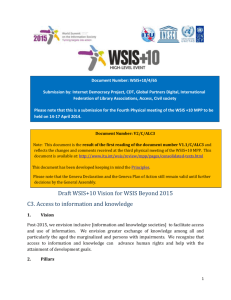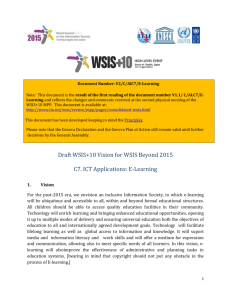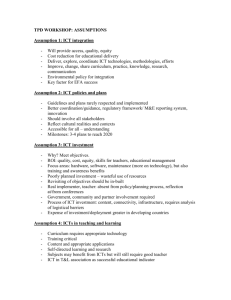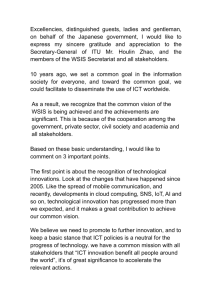Engendering ICT Policies in Africa WSIS Gender Caucus Efforts
advertisement
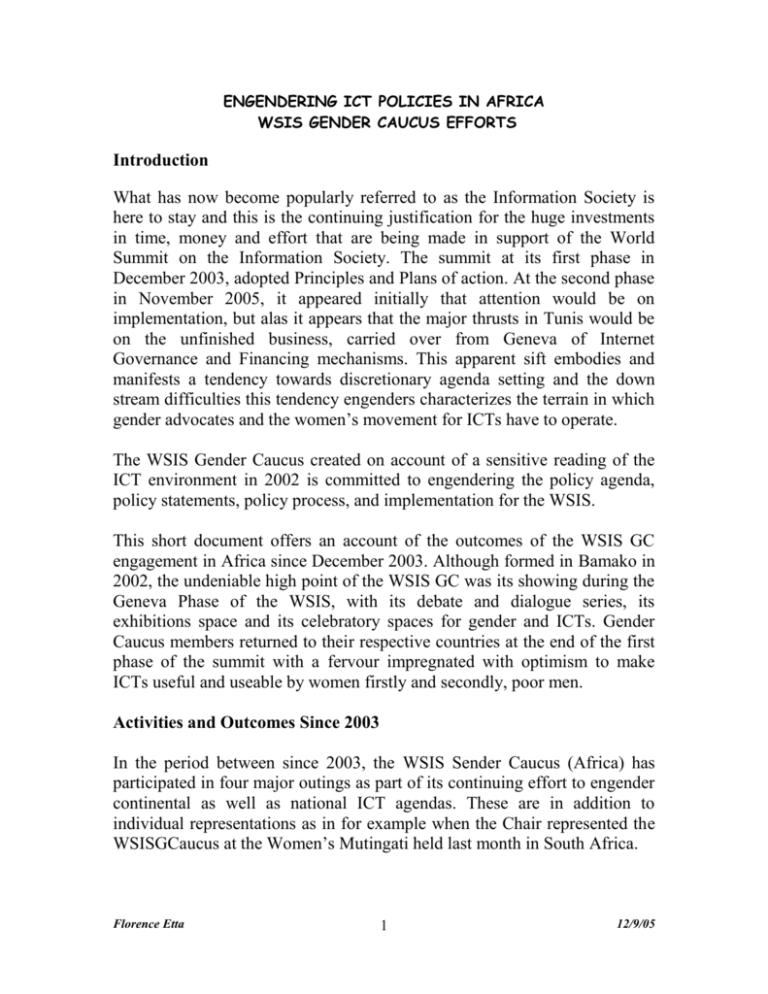
ENGENDERING ICT POLICIES IN AFRICA WSIS GENDER CAUCUS EFFORTS Introduction What has now become popularly referred to as the Information Society is here to stay and this is the continuing justification for the huge investments in time, money and effort that are being made in support of the World Summit on the Information Society. The summit at its first phase in December 2003, adopted Principles and Plans of action. At the second phase in November 2005, it appeared initially that attention would be on implementation, but alas it appears that the major thrusts in Tunis would be on the unfinished business, carried over from Geneva of Internet Governance and Financing mechanisms. This apparent sift embodies and manifests a tendency towards discretionary agenda setting and the down stream difficulties this tendency engenders characterizes the terrain in which gender advocates and the women’s movement for ICTs have to operate. The WSIS Gender Caucus created on account of a sensitive reading of the ICT environment in 2002 is committed to engendering the policy agenda, policy statements, policy process, and implementation for the WSIS. This short document offers an account of the outcomes of the WSIS GC engagement in Africa since December 2003. Although formed in Bamako in 2002, the undeniable high point of the WSIS GC was its showing during the Geneva Phase of the WSIS, with its debate and dialogue series, its exhibitions space and its celebratory spaces for gender and ICTs. Gender Caucus members returned to their respective countries at the end of the first phase of the summit with a fervour impregnated with optimism to make ICTs useful and useable by women firstly and secondly, poor men. Activities and Outcomes Since 2003 In the period between since 2003, the WSIS Sender Caucus (Africa) has participated in four major outings as part of its continuing effort to engender continental as well as national ICT agendas. These are in addition to individual representations as in for example when the Chair represented the WSISGCaucus at the Women’s Mutingati held last month in South Africa. Florence Etta 1 12/9/05 Conference on Women and ICTs; the Road to Tunis Aware that one practical way to influence policy makers was through gathering and tabling evidence, the first major engagement of the WSIS GC Africa was to hold a conference. In October 2004, the WSIS Gender Caucus in collaboration with the Tanzanian Ministry of Communication and Transport and AITEC Tanzania, organized the first ‘Road to Tunis’ conference on Women and ICTs. The idea of this workshop, mooted in the corridors of Palexpo Exhibition Centre, was inspired by the exhibition stands of the ICT4D Platform during the phase 1 of the World Summit on the Information Society (WSIS) in December 2003 in Geneva. The motivation and intention was to chart an East Africa/African route to Tunis and thereafter, for the Information Society through regional consultations and meetings where the issues hindering women’s access, use, adoption and development of ICTs in the region and examples of good practices would be discusses and showcased. The 3-day conference welcomed 45 delegates from 12 countries to share experiences and exchange ideas on the critical question of women and ICTs in Africa. The aim/goal of the conference was to amplify the opportunities and discuss solutions for the effective participation of women in the WSIS process and to place a gendered agenda on the global ICT platform in the bid to create an inclusive Information Society and economy. The specific objectives of the conference were as follows: 1. Design a roadmap that will ensure that African Women ICT experiences, products and skills are documented, presented and efficiently demonstrated in Tunis summit in 2005. Showcase and share experiences of best practices in the use of ICT for social and economic transformation.\ 2. Discuss ICT Policy and Governance, ICT education, Research and Development. The conference offered a platform for knowledge sharing and networking, and the interrogation of available applications and technologies within the contemporary realities of the continent. 3. Provide training on Gender, gender responsive evaluation of ICT initiatives and the application of ICTs in Agriculture. Florence Etta 2 12/9/05 The conference, opened by the Tanzanian Deputy minister in the Ministry of Transport and communications; Honourable Dr. Maua Daftari (MP), highlighted the following challenges: Inclusion of Gender Issues in government policy-making, Priority setting, cultural diversity. Poverty, lack of sufficient middle class, which is a result of poor governance and prioritization. Poor funding strategy, dependence on donor funding and diversion of funds. Leadership insensitive to ICTs and their potential for addressing poverty and women’s poverty in particular. Lack of awareness, local content and high cost of services. Too few community Telecenters. Weak infrastructure, bandwidth, few computers, ICT training opportunities, Trainers, etc. A declaration was made and accepted by the government of Tanzania, which also promised to study the recommendations, (see attached). WSIS Africa Regional Preparatory Conference The WSIS Gender Caucus was very actively involved in discussions and deliberations; holding daily meetings, consultations and Radio interviews in Accra Ghana during the Africa Regional Preparatory Conference of the WSIS. The hard work paid off handsomely when the Gender WSIS Gender Caucus was given a slot at the closing plenary to table its proposals and recommendations (see below). On account, the word gender made it into the final ‘Accra commitments for Tunis 2005’, the official out come document of the prepcom, (available online at http://www.uneca.org/disd/). Florence Etta 3 12/9/05 WSIS GENDER CAUCUS: SUMMARY OF RECOMMENDATIONS TO THE SECOND WSIS AFRICA REGIONAL PREPARATORY CONFERENCE ACCRA, GHANA, 2-4 FEBRUARY 2005 The WSIS Gender Caucus places great importance in aligning the WSIS preparatory process and outcomes with achievements of the Millennium Development Goals and urges Governments and the International Community to acknowledge and treat the integration of gender equality and women’s rights in the IKS and ICTs as a fundamental issue. The Gender Caucus acknowledges the significance of the African Regional Preparatory Conference for the second phase of WSIS, commends the theme "Access Africa's key to an inclusive Information and Knowledge Society" and recommends collective action of all African stakeholders for the integration of a gender perspective in the Information and Knowledge Society in general and ICTs in particular. For the WSIS Gender Caucus, ICTs include traditional and new technologies, especially in the new era of convergence. This is the WSIS Gender Caucus’ statement of recommendations on the major IS issues presented at the Accra meeting. We underline the fact that ACCESS is key; access to financing, infrastructure, technologies etc. and we urge proactive, committed and gendersensitive actions and attitudes on the following: Issue 1: Financing the Information and Knowledge Society Adequate and sustainable resources are required to fulfil the goals of WSIS. We recommend gender-sensitive budgeting, support for the Digital Solidarity Fund (DSF), creative financial investment schemes and facilities which do not restrict women only to micro credit, the allocation of targeted funds for gender and ICTs and the involvement of Development Banks (national and continental) in the creation of ICT investment products and services. Issue 2: Indicators and benchmarking Measurable performance indicators must be defined within a gender and cultural analysis framework as a basis for the generation and collection of appropriate statistics and indicators on the Information and Knowledge Society. The Gender Caucus recommends that all IS and ICT indicators be engendered and all data gender disaggregated. Issue 3: ICTs for socio-economic development There is a great deal of faith in the potential of ICTs to positively support socioeconomic development. We recommend more profound gendered analysis of impacts, training and capacity development for women and men, literate as well as non literate, “ICTs and Development” and entrepreneurship as a means to improve the positive effects on enduring development. Issue 4: Access and infrastructure Infrastructure is paramount and basic telephone connectivity in Africa is significant but not a sufficient condition for enduring development. We recommend that infrastructure be made available within walking/reaching/holding distance of all and should include Florence Etta 4 12/9/05 mobile, wireless, broadband as well as wire options to reach all parts; rural and urban. Hardware, equipments, software and content should be made available (in local languages) and affordable to the majority. Issue 5: Industrialisation Growth of the ICT industry is important for developing economies and ought to benefit both men and women. The WSIS gender Caucus recommends that ICT industries (including computer refurbishment industries) should be supported and that more women should be involved and engaged as producers and workers in both hardware, software and content industries and enterprises. Issue 6: Internet Governance The global Information and Knowledge Society depends heavily on the Internet as its main infrastructure and this global resource should be governed so as to enable the full participation of Africans; women and men. We recommend consideration for a gendered dimension of impacts and implications of the policies of Internet Governance and that both men and women are equally represented in global ICT governance structures and institutions. =========================== GKP “International Forum Cairo In May 2005, the WSIS in collaboration with the GKP and the Association for Progressive Communications, Women’s Networking Support Programme (WNSP) organized a 2-day workshop as a capacity building event for ten members of the WSIS GC Africa region and others. Some of the participants joined in the discussions of the GKP “International Forum on Advancing ICT solutions for Development through cross–sector Partnerships”. Participants felt fulfilled by new understandings and learned how to analyse projects and policies with a gendered lens. The intention was that upon their return, participants would interrogate more critically, national ICT policy, process and institutions through a gender prism. Sample comments - The Gender and ICT policy session was an excellent experience. It gave us an insight how Gender should be looked at while writing policies. The time was limited. It would be good idea if the training on gender and ICT policy could be organized again for 4-5 days. The breakout sessions were an opportunity to address specific issues related to Gender and ICT issues. Specific reference can be made to the session I was part of which dealt with Gender and ICT policy issues. I found these sessions very Florence Etta 5 12/9/05 - - - important especially in emphasizing the importance of integrating gender and ICT issues in policy development. The breakout session on policy was very qualitative. It gave us an opportunity to practically analyze specific aspects within ICT policy documents and its meaning in the perspective of gender and ICT. It opened out thinking and need to practically participate in policy process if our issues are to be incorporated. This was a very practical experience that helped me to link the issues of Gender and how I can ably be analytical with developing indicators as well as carrying out the evaluation. Helped me interface with policy documents. Deeper understanding of Gender language in a policy and be able to identify the Gaps. WTDC 06 Regional Preparatory Meeting Abuja The WSIS GC was invited to animate the workshop on Women and ICTs at the Regional Preparatory Meeting for the World Telecommunications Conference 2006, held in Abuja, in July 2005. The outcome statement was adopted by Nigeria, and promises were made that it would be tabled for endorsement by the member states of the ITU. In all of these appearances, the WSIS Gender Caucus put forward positions and recommendations, which would not otherwise have been made had the WSISGC not been represented. A critical first step for influencing policy is getting an idea onto the agenda for discussion. If this does not happen no change can be expected. In the two years since Geneva, the WSISGC Africa has expended efforts in three mutually reinforcing activities, placing gender and ICT issues on the agenda of national and international high level discussions, amassing evidence to show the realities on the ground and equipping a growing band of Africans with conceptual and analytical skills for gender and ICTs. These experiences inform our positions. WSISGC Africa Positions on IG and Financing Our positions on the outstanding issues of Internet Governance and financing are reflected in the recommendations and proposals that we have made at the various conferences, and meetings summarized and these are as follows: ICT Governance including Internet Governance o Equal representation of women as men in all ICT governance structures. Florence Etta 6 12/9/05 o Gender analyses and indicators of all policy instruments and positions. o Equal involvement of men and women in implementation and R&D. o Capacity development for women in ICTs Financing While recognizing the limitations of the state and the important role of the private sector and the international private sector in particular, the transnationals, it is important to consider that women and poor men, the majority on the African continent cannot benefit from the Information Society if the market is completely unregulated. It is for this reason that the WSISGC Africa supports the Digital Solidarity Fund along side other financing mechanisms, such as subsidies, differential rates e.g. e-rate etc. We bemoan the absence of funding for Gender and ICT projects at the community level and the difficulty in particular, of accessing funds earmarked in Sector Wide Approaches (SWAPs) for women’s issues. We therefore recommend dedicated funding (baskets if yolike of many donors contributing) arrangements and flex funds for explorations and experimental projects in the area of women/gender and ICT. Challenges In addition to the large challenge that funding poses, the inconspicuousness of ICTs on one hand and Gender and ICTs on the other in the MDGs constitute a major drawback. Only one of the 18 targets identifies ICTs; this despite their power and potential to make a difference in practically all the 8 articulated goals. While conceding that the history of the MDGs might be said to account for the place accorded to ICTs it is nevertheless imperative that the goals of WSIS and the MDGs must converge for the aims of either to be fully achieved. This convergence to some extent has been goal of the WSISGC Africa. Two other challenges that the WSISGC Africa has faced include; I. The absence of women and gender sensitive individuals in the policy making apparatus at both national and international levels II. The nature of ICTs, which give the impression that they are neutral. An associated challenge is the absence of sufficient theoretical explications for the nexus between ICTs and gender since this is a Florence Etta 7 12/9/05 new field. The are is young and the literature is still amassed, yet politicians and policy makers need to understand the implications NOW in order to make responsible and sustainable policies that are inclusive. WSISGC Africa Support To date WSISGC Africa has been supported by the WSISGC (global whose funds come from a variety of sources and are managed by UNIFEM), the Canadian e Policy Resource Centre, IDRC, the Ford Foundation, AITEC and the government of Tanzania. Florence Etta 8 12/9/05 Attachment 1 Ministry of Communication and Transport ARUSHA DECLARATION Women and ICT: Challenges and Opportunities on the Road to Tunis 20 – 22 October 2004, Arusha, Tanzania We the 45 participants at the Women and ICT; Challenges and Opportunities on the Road to Tunis workshop held in Arusha between 20-22, October 2004 representing 12 countries Government, the Private sector, Civil society and the Academia. We have deliberated, discussed and shared experience on current challenges and potential of ICTs and Gender for the development and poverty reduction. We recognize and endorse all previous declarations, conventions and instruments that have been made in support of the equitable advancement of the World Information Society and the WSIS declaration and the WSIS plan of action. We recognize that ICTs including traditional and newer information and communication technologies are important tools for women development in Social and economic development and in the process of eradication of poverty. We are aware that ICT development provides opportunities for women to take part in information economy and are potential for reaching rural women and provide them with education, training, employment, entrepreneurship opportunities and access to market information. Florence Etta 9 12/9/05 We the participants collectively discussed the following issues regarding policy and governance, access and application, networking and education Policy and Governance Gender issues should be included in government policies; the process should be participatory and include other stakeholders like civil society and private sector. Content should be in local language and relevant to women especial in the rural area. Improvement of capacity building and empowerment of women. Clear link between ICT and economic and social development issues. Lack of Gender Analysis on ICT. Access & Application Affordability, access, sensitisation campaigns, subsidy of costs and exclusion of Taxes in ICT products and services. Promotion of local content and languages. Lack of interest of private sector in rural areas and weak/inadequate infrastructure. Networking & Education Forums/Discussions: Both Online and Offline. Teacher Training, E-leaning and ICT opens great outreach to education. Lack of Governmental/political priorities and good will/vision. Capacity Building on ICT Awareness. Challenges/problems raised Policy & Governance Inclusion of Gender Issues in Government Policy-making, Priority setting, Cultural diversity. Florence Etta 10 12/9/05 Poverty, lack of sufficient middle class, which is a result of poor governance and prioritisation. Poor funding strategy, dependence on donor funding and diversion of funds. Leadership is not sensitised about ICTS and their potential in addressing poverty. Access and application Lack of awareness, local content and affordability. Networking & Education Lack of Sensitisation, and community Telecenters. Lack of Infrastructure, Bandwidth, Computers, ICT Trainers, etc. We strongly recommend the following to the government, private sector, civil society and development partners Mandatory education including adult literacy programs, e-learning and improve capacity building and empowerment. Government and private sector work together to improve infrastructure and access Subsidize ICT Products and Services and Prioritise budget spending. Enhance capacity in local content development and promote the use of local language with relevant content. Establish Community tele- centres especially in the rural areas. Recognize of ICT as a gender and social issue and involvement of women in decision process. Encourage and promote research on ICT. Set up policies that will improve peoples standing thus increase the middle class. Educate government officials in order to improve governance and transparency. Improve on priority setting. Set fundraising strategy, reduce dependence on donor funding, implement clear government policies and monitor the degree of capital repatriation by investors. Place gender on the national ICT agenda of African nations. Accelerate the ICT process in those countries that have not started. Policy for rural areas, availability of satellites and use of low cost technology such as VSAT . Promote women’s groups and micro financing. Florence Etta 11 12/9/05
